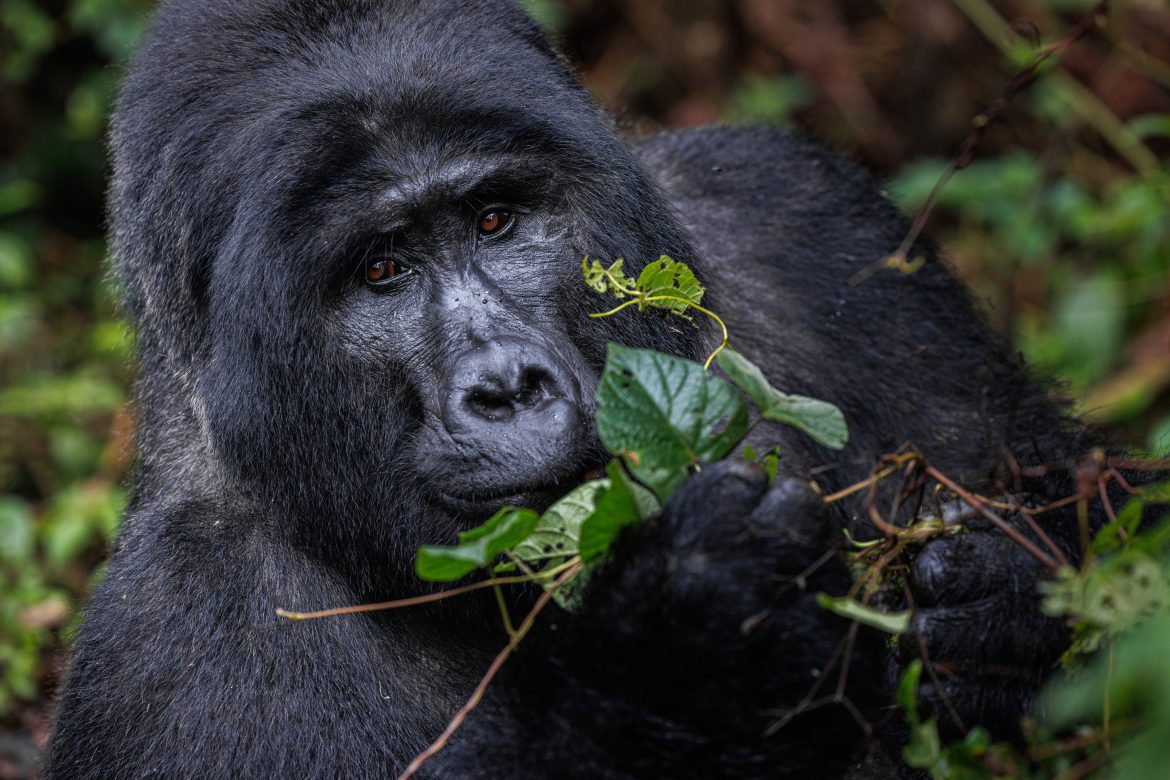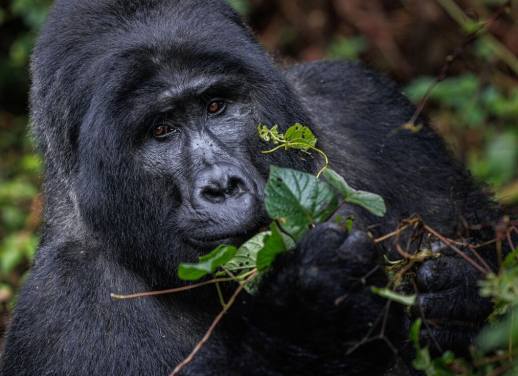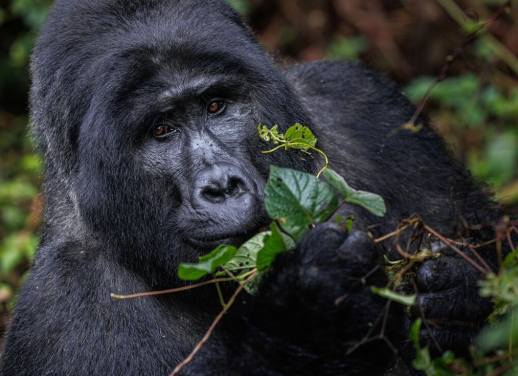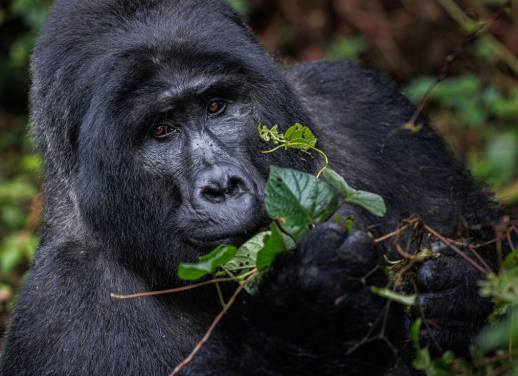In Uganda and Rwanda, a team of dedicated veterinarians – a new Intrepid Foundation partner – is working to protect endangered gorillas in their natural habitat.
In the mid-80s, the world’s population of mountain gorillas was near extinction, with fewer than 300 gorillas living in the rainforest shared by Rwanda, Uganda and the Democratic Republic of Congo (DRC).
Today, that number has grown to a little over 1000, distinguishing the great apes as one of the few endangered species on the rise. The increase is largely due to the tireless work of Gorilla Doctors, a non-profit based in all three countries and inspired by primatologist Dian Fossey.
In addition to conducting valuable scientific research, Gorilla Doctors provides hands-on care for naturally occurring illnesses and injuries (including those caused by interactions with humans and domestic animals). Consequently, they are credited with 40 per cent of the population’s growth over the last 40 years.
One of the highlights of my time on one of Intrepid’s gorilla trekking trips trip was meeting two veterinarians from Gorilla Doctors, Dr Ricky Okwir Okello and Dr Nelson Bukamba. They both work in Uganda’s Bwindi Impenetrable Forest National Park.
The timing of our get-together couldn’t have been more perfect. It gave our group even more reason to be excited about setting off on our gorilla trek the following day. During their two-hour visit, the vets shared fascinating, behind-the-scenes information and anecdotes about the efforts of Gorilla Doctors.
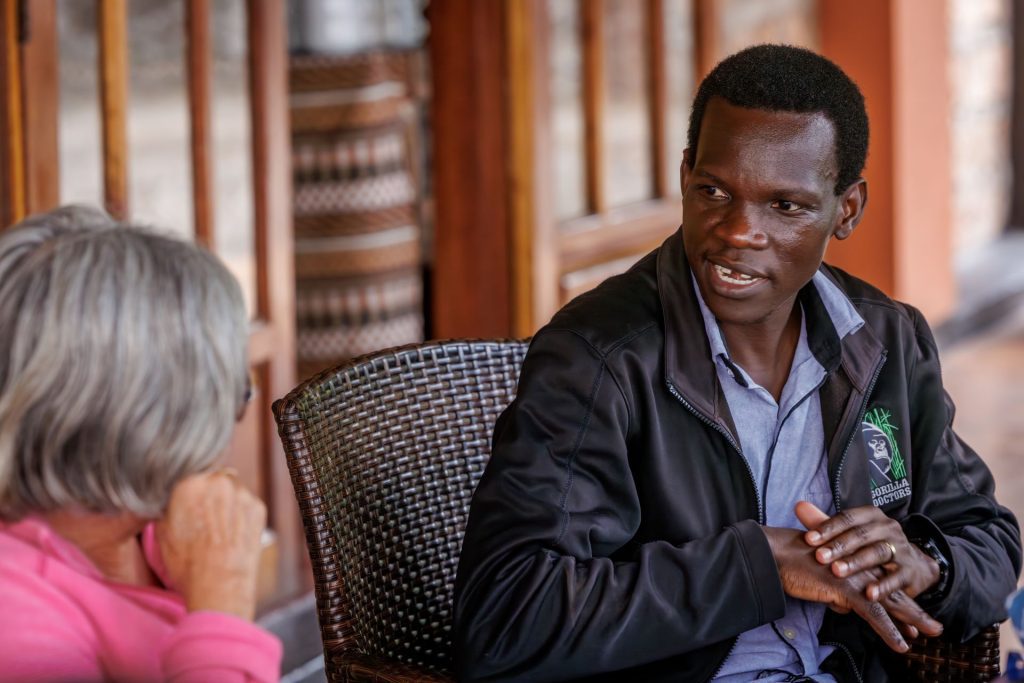
We learned they monitor the park’s 25 habituated gorilla families each month. Habituated means the gorillas are comfortable around humans, a process that can take up to two years of daily contact by experienced researchers before visitors are allowed to observe them. They look for signs of injury or disease and dispense vaccines and de-worming treatments as needed – in most cases, using dart guns to administer medications.
How to make a house call in the jungle
Gorillas are never removed from their natural habitat, so more complex procedures, such as x-rays, hydration and minor surgeries, are performed under anaesthesia in the forest. In the last decade, Gorilla Doctors have conducted over 2500 health checks, 260 interventions to treat illness or injury and 49 rescues from snares, with a 98 per cent survival rate across Rwanda, Uganda and the DRC. However, work in the DRC is currently on hold due to the region’s instability.
Fieldwork in Bwindi’s impenetrable rainforest isn’t easy. It can take hours to track a family; after darting one gorilla, the others can become aggressive.
‘When a gorilla starts sleeping [as a result of anaesthesia], the dominant silverback or other gorillas will come to fight,’ explains Dr Ricky. For this reason, nine or ten rangers accompany the doctors for protection.
Occasionally, in the case of painful wire snares, the gorillas don’t act out. Dr Ricky believes if the gorillas have seen a snare removed before, they may understand the vets are there to help. But, he adds, many times they are not as accommodating.
During one visit, Dr Ricky recalls, he darted a baby, prompting a silverback to grab it and run away. It took a long time for them to locate the infant, which they found awake and alone. The assumption was the silverback discarded it, believing the youngster was dead. So, after treating the newborn, they had to reunite the baby with its troop, which was another challenge.
A few gorillas who’ve undergone treatment have come to recognise specific doctors, and they take off as soon as the vet approaches. When that happens, they send a different physician to handle the case. Of course, gorillas aren’t the only wildlife in Bwindi. The vets must also watch for elephants and buffalo, which can become cranky when humans enter their neck of the woods.


To fulfil its mission, Gorilla Doctors relies on grants and donor funding. ‘Whenever there is an intervention, there are quite a number of things you need,’ says Dr. Ricky. ‘You need drug supplies, which are expensive. You need the transport vehicle and fuel. You need the field staff who are on salary, and you need porters. A veterinary intervention requires a good amount of money.’
Visit Gorilla Doctors’ Rwanda headquarters with Intrepid
In 2023, Gorilla Doctors partnered with the Intrepid Foundation, Intrepid’s philanthropic arm. Established in 2002, the foundation sponsors environmental and social initiatives from wildlife conservation and climate action to human inequality. Now, a portion of proceeds from Intrepid trips in East Africa goes directly to the Gorilla Doctors.
‘The Intrepid Foundation cares about protecting wildlife and we were impressed with the Gorilla Doctors’ impact in East Africa,’ says Biheng Zhang, general manager of the Intrepid Foundation. ‘We wanted to share their stories with our Intrepid travellers and help the amazing vets continue their important work.’
Intrepid travellers on Remarkable Rwanda & Gorillas of Uganda and Gorillas & East Africa Safari get the opportunity to visit the Gorilla Doctors headquarters in Musanze, Rwanda, to meet the vets and learn about their work. On Premium Rwanda & Gorillas of Uganda, a Gorilla Doctors veterinarian visits with travellers at Gorilla Heights Lodge and shares insights into their work.
This kind of face-to-face interaction, not only with the vets and their work but with the gorillas as well, creates a kind of tourist evangelism that plays a key role in the Gorilla Doctors’ success.
‘Gorillas are still endangered species, and most conservation relies on the tourism industry and the people who are coming to see these precious beings,’ says Dr Nelson. ‘Sharing the kind of work we do sort of entrenches that deep commitment of the global community to participate in conserving these animals.’
Dr Ricky agrees. ‘Whenever we talk to tourists, they go out and spread the good news about Gorilla Doctors, gorillas and conservation, and most people become interested in protecting wildlife.’
For the doctors, playing a critical role in the growth of the gorilla population transcends their commitment to their profession. ‘The work that we do, money can never pay,’ says Dr Ricky. ‘The pleasure we get is far more than the money we earn.’
Join a fireside chat with a Gorilla Doctors veterinarian on Premium Rwanda & Gorillas of Uganda or visit their headquarters on Remarkable Rwanda & Gorillas of Uganda. Learn more about the Intrepid Foundation’s partnership with Gorilla Doctors.
Top image by Susan Portnoy.

